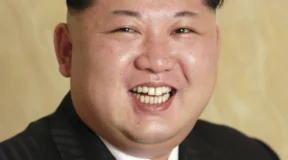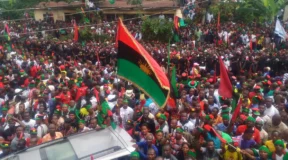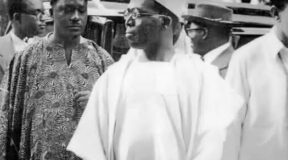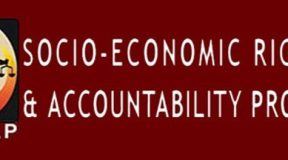Tinubu In 54 Days Of Groaning, Delayed Cabinet And Confidence Harm
OpenLife Nigeria reproduces an earlier report on the hardship unleashed on Nigerians by the current administration
A student of the University of Benin, who simply gave his name as Dave, planned to travel from Benin-City, the Edo State capital, to Lagos last Monday for a short holiday. But he had to postpone the trip till the next day under a cloud.
On that Monday, Dave got to the popular Iyare Motors Park at Iyaro and met the shock of his life. The lady at the ticket box told him the fare was N15,000. Alarmed, he called his schoolmate who had travelled a week earlier to confirm the fare he had told him he paid and which he had conveyed to his parents. He heard him right, it was N10,000, a 100 per cent increase after the May 31, 2023 price hike of petrol from N195 to average N537 per litre by the Nigerian National Petroleum Company Limited (NNPCL).
Deflated, Dave who was happy he had an extra N2,000 added to the old fare to spend on the journey, summoned courage to call his father and told him about the new fare. Expectedly, his civil servant father bristled at his thoughtlessness, but managed to ask him to postpone the trip till Tuesday as he needed to mobilise some money for him by then.
On getting home at about 4 pm that Tuesday, Dave who had expected to meet a welcome treat of wholesome food was told by his siblings that their mother had gone to the market and was unusually delayed. She eventually came home, but with a tale of woe. Arbitrary increase in transport fare, sudden increase in the prices of meat, fish and ingredients for soup had caused the delay as she had to sample prices before buying any item, she told her family.
Dave was saddened to hear that the N5.000 extra cost sent for his fare affected the cash at her disposal.
“This experience shows the uncertainty we have to face about the future. I cannot even imagine the hardship ahead of us under the current regime of subsidy removal. The new increase in the price of petrol after the first one will certainly raise costs of living higher. This is frightening,” Dave’s father told THEWILL at the weekend.
This account of uncertainty and lack is a reflection of the situation in many Nigerian homes that still have sources of income. It is worse for those whose real incomes have been severely diminished by President Bola Tinubu’s arbitrary removal of fuel subsidy on May 29, 2023.
For this and other middle class families that depend on a fixed low income amid the rising cost of house rent, petroleum products, transportation, school fees and food stuff all of which continue to be subjected to inflationary pressures, the Wednesday, July 19, 2023 further increase of the pump price of petrol by the NNPC Ltd from N537 to N617 per litre can only mean one fact: increased pain, mental stress and hunger.
Low income businesses, which were severely cash-strapped as a result of the Federal Government’s money redesign policy, are also reeling under the burden of the fuel price-induced high transportation cost and the unification of forex windows, all of which have led to further depreciation of the Naira from N440 to N777 and N1,000 (parallel market) at the weekend.
THE PROBLEM
Between the May 31 and the July 19, 2023 increase in the price of petrol, the statistics are stark: According to the World Bank, recently 4 million Nigerians were “pushed into the poverty trap in the first six months of 2023 with another 7.1 million more expected to join the conundrum if properly targeted measures are not taken to manage the impact of fuel subsidy removal.”
This is in addition to the 153 million Nigerians suffering multi-dimensional poverty. Inflation, in just one month from May to June 2023 soared from 22.41 per cent to 22.79 per cent, according to the National Bureau of Statistics in its Consumer Price Index and Inflation Report. On a year-on-year basis, the NBS said, inflation was between 4 and 19 per cent points higher than June 2022, which was 18.60 per cent.
As a sign of things to come in the days ahead, the education sector was rattled by the Federal Ministry of Education’s announcement on Friday that school fees for students enrolling in Federal Unity Colleges have been increased from N45,000 to N100,000. At the tertiary level, a government-owned university, the University of Lagos, announced an increase in tuition from N19,000 to N140,000.
The depth of fuel subsidy removal has gone beyond just the pump price of petrol!
GOVERNMENT PALLIATIVE MEASURES
In the midst of this ravaging hardship, the Federal Government, which had fumbled for the past months after announcing palliative measures of N8,000 cash transfer to 12 million “poor-of-the poor” families, responded to criticism of its seeming indifference in policy execution. It announced that its subsidy measures are wide-ranged including release of fertilizers and grains to 50 million farmers and households across the 36 states and the Federal Capital Territory and the President’s recently signed Executive Orders meant to alleviate the burden of taxes as well as the suspension of the implementation dates of certain tax regulations.
Also, the National Executive Council held an emergency meeting last Thursday, after which the government directed all 36 state governors to generate cash registers to enable the cash transfer policy.
The 12 million households are to receive N8,000 monthly cash transfer for six months.
REACTIONS
Nigerians who are for and against subsidy removal and the cash transfer policy are united by one consideration. Nigerians of all hues need immediate relief from the barrage of stressful social and economic challenges. The difference is with the nature of the stated problem and the solutions being provided for them.
Ordinarily, Tinubu had alerted Nigerians of his plans on subsidy removal during electioneering. In his manifesto, however, the section where he talks about subsidy removal failed to match the May 29 inauguration declaration.
Under the headline: ‘Phased Out Fuel Subsidy’ the presidential candidate stated that the aim of his administration was to achieve stability in the supply of petroleum products by fully deregulating the downstream sector and ensuring that local refineries run at full capacity to meet domestic consumption needs.
“To this end, the government shall phase out fuel subsidies yet maintain the underlying social contract between government and the people.
“Subsidy removal and deregulation are, however, only part of the solution. To further increase our refining capacity, we shall focus on the rehabilitation of the nation’s refineries and shall consider, as a model, the joint venture partnership arrangements implemented by other leading oil-producing states and global petrochemical firms.”
On inauguration day, however, Tinubu went against his resolve, announced off the cuff that “fuel subsidy is gone” because he “was possessed with courage to announce the fuel subsidy is gone” as against “phased out,” in his prepared speech, as he told his audience in France during a recent global business conference in Paris in June.
Since then, hell has been let loose on all fronts in the country and the impact has been wide-range, just as the reactions.
“The problem is not fuel subsidy, but corruption and deception tied to it. Over N25 billion have been voted for turn-around maintenance and yet the refineries are not working. Fake marketers who imported fuel and were paid huge sums of money are walking free. We need an audit on all these things.
Even the palliative of N8,000 per month, if it even reaches the so called poor, will not make any difference in the lives of the beneficiaries, given the current high cost of living, ” General Secretary of Nigeria Conference of Political Parties, CNPP, Chief Willy Ezugwu told THEWILL in a brief interview.
He said the government in 2018 announced that it had removed the subsidy on petrol and proceeded to increase fuel prices from N89 to N145 per litre and subsequently to N195.
In a statement sent to this newspaper on Friday evening, he said that the CNPP recalled that in May 2016, the APC-led Federal Government had announced the removal of subsidy on petrol, which prepared the ground for Nigerians to pay N145 per litre.
He quoted the former Minister of State for Petroleum Resources, Ibe Kachikwu, who had announced that the government implemented the removal of subsidy on fuel on May 11, 2016, to the effect that the removal of subsidy from the pump price of premium motor spirit is “saving the Federal Government over N1.4 trillion that would have been expended on subsidy claims per annum.”
“Check out the Minister’s statement on the website of the Nigerian Content Development and Monitoring Board. From that date till today, the APC-led government has been increasing the pump price of petrol under the guise of subsidy removal without adequate cushioning palliative leading to untold hardship Nigerians have continued to endure. So, on May 29, 2023, President Ahmed Tinubu scrapped the already removed subsidy announced by the Muhammadu Buhari Administration in 2016.”
Taking a slightly different view, the Christian Association of Nigeria on Friday saluted the Federal Government’s decision to remove the subsidy on petrol, but added that it should not be too idealistic about the policy and the anticipated impact.
According to the CAN President, Most Reverend Daniel Okoh, given the massive corruption that characterised the fuel subsidy regime over the years, there was a general consensus that the removal of fuel subsidy had become inevitable if the Nigerian economy must experience sustainable growth.
“However, it was also generally agreed that this must be done in such a way that Nigerians will not be subjected to untold hardship. In other words, what is idealistic must be balanced with what is realistic,” he said.
Okoh noted that Nigerians were trying to adjust to the initial increase in the fuel price to N540 per litre and its consequential effect on the cost of transportation, food, goods and services, as well as the general cost of living, when another hike to N617 per litre of petrol was announced, thereby placing an enormous burden on the already struggling masses and further widening the gap between the rich and the poor, as well as drastically eroding the purchasing power of ordinary citizens to afford the basic necessities of life.
“The situation is just unbearable for millions of Nigerians who are already suffering poverty. While CAN acknowledges the complex and difficult decisions that the government must take to manage the nation’s economy, there is an urgent need to prioritise measures that will alleviate rather than exacerbate the existing poverty level and hardships of Nigerians.
It is therefore imperative that economic policies are formulated and implemented with utmost care and consideration for the prevailing hardships experienced by Nigerians,” he said and urged the government to go beyond the N8,000 cash transfer as palliative.
The Chartered Institute of Taxation of Nigeria, which had praised President Buhari on the new tax deferment on Friday, however, advised the president to reconsider the pace and manner in the implementation of economic policies to avoid dislocating the country’s economy.
While speaking to journalists in Abuja during a conference organised by CITN and the Association of National Accountants of Nigeria (ANAN), the organisation’s president, Samuel Agbeluyi, said that while the government must be commended for “removing the fuel subsidy that has not helped anybody in the country and for setting up a committee to reform the tax system in the country, we will like to advice the government to be a little slow and not drastic in some of its decisions, for instance, the impact of the removal of subsidy leading to the current price of petrol is enormous on the citizens.” He frowned at the cash transfer policy as a form of palliative.
GROUNDS FOR DOUBT
Having found out that the National Social Register used by the Muhammadu Buhari Administration for cash transfer failed what the government called “integrity test,” the 36 states and the Federal Capital Territory have been asked to generate their own registers, thus creating grounds for the doubtful implementation of the policy.
Explaining the involvement of Anambra State in the cash transfer scheme to journalists in Abuja after the NEC emergency meeting with Vice President Kashim Shettima last week, Governor Charles Soludo accidentally listed the challenges that the intervention may face.
Answering questions on the implementation of the intervention, Soludo said the amount to be paid out under the cash transfer programme would depend on the capacity of respective states.
The Anambra governor added that those that have outstanding salaries, pension and allowances to pay must prioritise clearing the backlog instead of implementing cash transfers.
He explained, “We have suggested that it will be nice that you can implement cash transfers, subject to your financial capacity. For example, suppose you have a state where the salary arrears of workers have been owed for three years or four years. In that case, the priority now is to start paying down some of the salary arrears or where pensioners have been owed their pension and gratuity for several years.”
STILL NO FEDERAL CABINET
Despite the promise to hit the ground running immediately after inauguration, the delay in forming a new federal cabinet is making it increasingly difficult for the President to implement his programmes and policies. The Ministers are supposed to be executioners of the programmes.
Observers of the current trajectory believe that Tinubu may have underestimated the magnitude of the problems presently facing the country, otherwise, he would have thought that by now, his cabinet should have been in place .
“These are not times for play at all. The economy is in very very bad shape, people are frustrated and hungry. Naira is plunging badly and people can even barely eat a meal a day . It is a big mess! Without the Ministers, who will implement his programmes, ” a social commentator told THEWILL on condition of anonymity.
WAY FORWARD
For the Christian Association of Nigeria, the government should meet with critical stakeholders to find solutions to develop comprehensive economic policies that promote inclusive growth, job creation, social well-being, diversify the economy, reduce dependency on volatile commodities and promote investments in sectors with the potential to create sustainable employment opportunities.
“Government must listen to the concerns of the Nigerian people and implement sound economic policies that prioritise the well-being of all citizens. By addressing the prevailing hardships caused by the recent fuel price hike and high inflation, we can pave the way for a brighter future for Nigeria,“ Okoh said on Friday.
The Independent Petroleum Marketers Association of Nigeria, IPMAN, decried the sudden hike in pump price of petrol twice within two months. For him, the ultimate way forward is for President Tinubu to declare a state of emergency in the petroleum sector.
The Chairman of the Rivers State Chapter of IPMAN, Dr Joseph Obele, said the solution is fixing the refineries, otherwise the increase in the pump price of petrol “is going to bring hardship to the citizens and marketers will need to source for additional trading capital in order to remain in business.”
Supporting the refinery option, Chief Ezugwu said if the major refineries are put back into good working conditions, much of the petroleum related challenges will be solved.
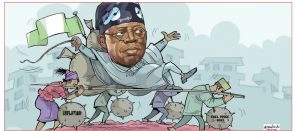
Courtesy: Text, except headline, The Will



